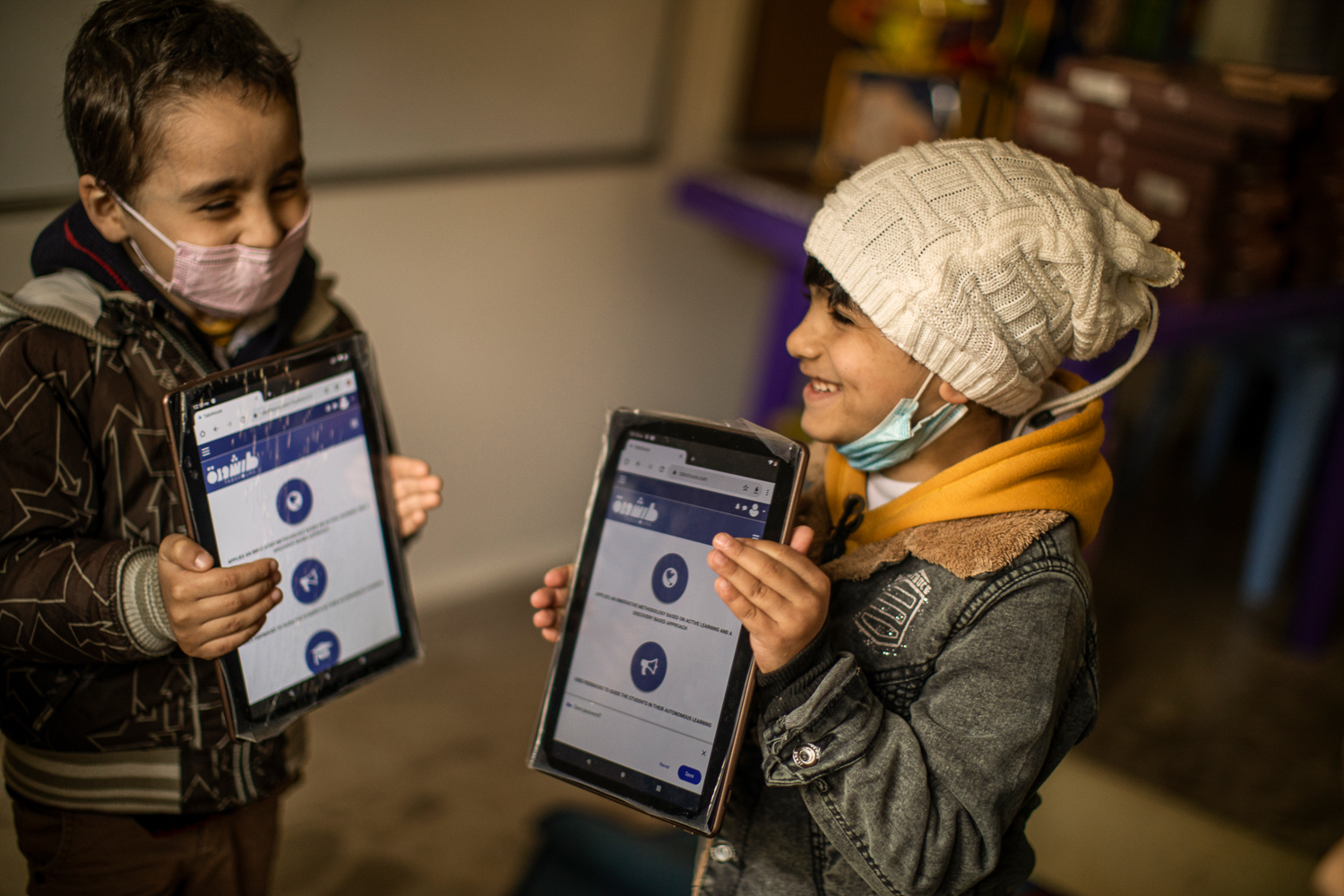
Why we must give young people the skills today they’ll need for the jobs of tomorrow
Education funding, Girls' education, Sarah Brown, Sustainable Development Goals, Teachers and learning, Technology and education, The Global Business Coalition for Education (GBC-Education)
On the eve of World Youth Skills Day, we look at why innovation and investment are vital if millions of young people are to be equipped for the workplace of the future.
“The future depends on what you do today,” said Mahatma Gandhi.
Seems obvious really. But in some countries 80% of the jobs young people are being prepared for may not exist when they graduate.
Here are two more sobering statistics.
Up to half of the world’s jobs – around two billion – are at high risk of disappearing due to automation in the coming decades.
That will radically alter the demand for skills.
On current trends, half of the world’s children – more than 800 million of them – will leave school without the skills needed to find a job in 2030.
That will have huge implications for countries, communities and families.
So what we do about it? We follow Ghandi’s advice.
“Today we have to educate our children for jobs that don’t even exist,” declared Argentina’s President Mauricio Macri on the eve of last week’s G20 summit of the world’s most powerful nations.
Macri, whose country will have the presidency of the G20 next year, added: “Education systems need to expand, to innovate, to be ready to change. And we have to do all this together, with a lot of dialogue.”
Tomorrow, global focus will be on those issues. World Youth Skills Day shines a light on the employment obstacles faced by young people and the solutions that can help them get the right skills and jobs. The theme this year is “Skills for the Future of Work”.
The way we work – as well as live and relate to other people – is fundamentally changing, according to Professor Klaus Schwab, Founder and Executive Chairman of the World Economic Forum.
In his influential book The Fourth Industrial Revolution, he says new technologies will impact every aspect of our lives.
“The changes are so profound that, from the perspective of human history, there has never been a time of greater promise or potential peril,” he writes in the introduction.
Schwab says the world has the chance to connect billions of people, dramatically improve the efficiency of organisations and manage assets in ways that can help regenerate the natural environment.
On the other hand, organisations might not adapt, governments could fail to employ and regulate new technologies, inequality could grow and societies fragment.
When the G20 leaders met in Hamburg, youth skills didn’t exactly hit the headlines among all the talk of climate change, trade and Syria. But the G20 quietly made significant commitments to helping the next generation – particularly on digital and technical training.
The Leaders’ Declaration issued at the end of the summit said: “We will promote digital literacy and digital skills in all forms of education and life-long learning.”
By 2030, substantially increase the number of youth and adults who have relevant skills, including technical and vocational skills, for employment, decent jobs and entrepreneurship. One of the targets of Sustainable Development Goal 4 (quality education for all)
The G20 Action Plan agreed in Germany also included:
- Promoting education, employment and entrepreneurship opportunities for women and girls in the digital economy – particularly in low-income and developing countries
- Increasing support for innovative, jobs-oriented skills development projects for at least five million people over the next five years, with particular focus on rural young people in Africa
Those promises have been welcomed by Sarah Brown, Executive Chair of the Global Business Coalition for Education (GBC-Education) – a group of more than 100 leading companies committed to being ahead of the curve on the need for new skills.
Sarah said: “With the Fourth Industrial Revolution shaping the future at a rapid and unpredictable speed, preparing young people with the skills needed to navigate and co-create the future workforce is important now more so than ever before.
“GBC-Education is committed to being on the forefront of this next generation of skills development and applaud the G20’s commitment to this issue.”
Rosalind L. Hudnell is Vice President of Corporate Affairs, Intel Corporation and President, Intel Foundation – and a member of GBC-Education’s Advisory Board.
She said: “It is critical that we invest in the next generation of innovators and workers. Through our Intel® Innovation Generation initiative, we are redefining what it means to be an innovator by expanding who has access to technology skills and experiences.
“We are committed to working alongside others to close the global youth skills gap and provide young people with the skills needed to solve the problems they and their communities face.”
Theirworld also believes that every young adult should have access to skills development. We are raising awareness through reports, projects and campaigns.
An understanding of computer science is becoming increasingly essential in today's world. Africa is crying out for young women with STEM skills and knowledge. Amina Shaaban, Deputy Manager for Education at BRAC
Our #RewritingTheCode campaign is aimed at changing the embedded values that keep millions of girls around the world out of school. It calls on the international community to start getting serious about shaping the future for a generation of women.
We have launched Code Clubs in Kenya, Uganda, Nigeria and Tanzania. They are safe spaces where girls can learn about technology and develop their skills, confidence and creativity. They learn how to build a computer, make games and artworks, and express themselves with code.
Earlier this month, it was announced that Theirworld is teaming up with Voith to celebrate the multinational company’s 150th year of global operations by launching Code Clubs in Tanzania, where more than 700 girls and young women will be able to learn technical skills.
This follows the launch of other Code Clubs in Tanzania, in association with the charity BRAC. Amina Shaaban, Deputy Manager for Education at BRAC, said: “The opportunities that coding will create for the girls in these communities is immeasurable. Most, if not all, have never even seen a computer before.
“An understanding of computer science is becoming increasingly essential in today’s world.
“Africa is crying out for young women with STEM (Science, Technology, Engineering and Mathematics) skills and knowledge – and these Code Clubs will provide these young girls a whole new window of opportunity and interest that they never had a chance to explore.”
Young people not only need to benefit from a new emphasis on youth skills – they need to be right at the heart of it.
So it’s fitting that the newly-appointed United Nations Envoy on Youth is just 26 years old.
Jayathma Wickramanayake from Sri Lanka is credited with having established the “Hashtag Generation” – a large civic and political engagement movement of young people.
She has also represented and motivated global youth development at an international level since the age of 21 – including the declaration of World Youth Skills Day.
“In an era where the world is quickly moving to implement the 2030 Agenda for Sustainable Development, it is of utmost importance that the voices of young people are heard, valued and acted upon,” she said when her appointment was announced last month.
As the world changes at breakneck speed, the need for young people to acquire the skills today for the workplace of tomorrow is absolutely vital.

More news

Sarah and Gordon Brown share global education vision in 100th episode of Better Angels podcast
